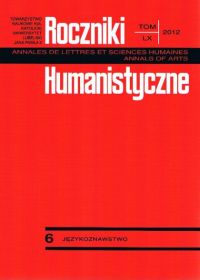Persuasive Genres in Social Communication
Abstract
The objective of this paper is to present a typology of genres with the persuasive communicative function. The author adopts a stylistic and a textological (genological) perspective. Social communication is defined as a kind of contact between mostly institutional message senders with mass audiences, so easily targetable through the channels of modern media. The text proposes a classification of the particular objects of analysis based on the persuasive function they perform. The persuasive function is defined as a deliberate targeting of a text at the presupposed addressee with purposeful emphasis on the role of the addressee in the reality depicted in the message. The persuasive function also assumes that the text is to influence the addressees’ emotions, their will and rational actions. This, however, is not achieved through a direct appeal to the addressees, but indirectly, by means of argumentation, evaluation, suggestion and interpretation. This perspective allows the author to construe an area in which the particular genres are placed. The typology assumes that certain texts are prototypically maximally persuasive, while in others this function is more peripheral. In this way the author arrives at the following classification of persuasive text genres: advertisements/commercials, slogans, public relation texts, court speeches, parliamentary speeches, exposès, appeals, promotion/persuasive speech, preaching, homilies, commentaries, reviews, columns, interviews, reports, profiles, debates, announcements, trailers, leads, editorials, editors’ prefices, lectures, speeches, conversations, laudations, arguments, reprimands, boasts, motivation letters, recommendations, reference letters, (job/qualification) interviews.
References
Barańczak S.: Słowo – perswazja – kultura masowa, „Twórczość” 1975, nr 7, s. 44-58.
Boniecka B., Panasiuk J.: By wyjść poza standard (życiorys, podanie a list motywacyjny), w: Gatunki mowy i ich ewolucja, t. II: Gatunek a tekst, red. D. Ostaszewska, Katowice 2004, s. 75-92.
Dialog a nowe media, red. M. Kita, Katowice 2004.
Jacobson R.: Poetyka w świetle językoznawstwa, w: Współczesna teoria badań literackich zagranicą, t. II, red. H. Markiewicz, Kraków 1972.
Kita M.: Wywiad prasowy. Język – gatunek – interakcja, Katowice 1998.
Loewe I.: Stylistyczna perspektywa tekstu perswazyjnego, w: Stylistyka a pragmatyka, red. B. Witosz, Katowice 2001, s. 347-357.
Loewe I.: Renesans laudacji, w: Żonglerzy słowami. Językowy potencjał i manifestacje językowe, red. M. Kita, M. Czempka, Katowice 2006, s. 167-177.
Loewe I.: Gatunki paratekstowe w komunikacji medialnej, Katowice 2007.
Loewe I.: Retoryka w reklamie, w: Retoryka, red. M. Barłowska, P. Wilczek, Warszawa 2008, s. 250-271.
Wilkoń A.: Typologia odmian funkcjonalnych języka polskiego, Katowice 1987.
Witosz B.: Genologia lingwistyczna. Zarys problematyki, Katowice 2005.
Wojtak M.: Pragmatyczne aspekty analiz stylistycznych tekstów użytkowych, w: Stylistyka a pragmatyka, red. B. Witosz, Katowice 2001, s. 38-47.
Wojtak M.: Gatunki prasowe, Lublin 2004.
Copyright (c) 2012 Roczniki Humanistyczne

This work is licensed under a Creative Commons Attribution-NonCommercial-NoDerivatives 4.0 International License.





